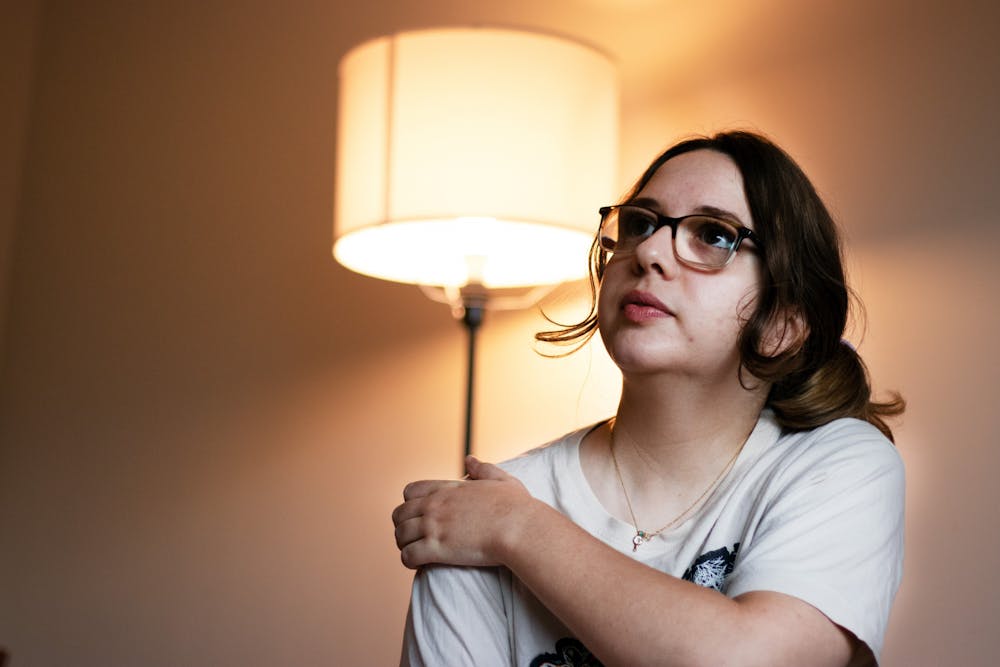Eva Garcia Ferres can’t afford a car, so her partner bikes to his job at Winn-Dixie while she takes the bus or bikes to UF, where she works as a graduate research assistant in the psychology department.
While her doctor’s prescription deemed the purchase necessary, she mulled over buying a pair of $400 glasses. When her partner was sick with COVID-19 in the fall and wasn’t recovering, the couple sacrificed $300 for treatment.
These necessities can be an extreme financial burden to a second-year graduate research assistant like Garcia Ferres, who survives off a yearly stipend of $19,600.
“We still live within the same system where we have to produce something that gives somebody else money,” Garcia Ferres said.
Graduate assistants are continuing to advocate for higher pay, with Garcia Ferres citing the rising cost of living as an ongoing issue that needs to be addressed by universities. This is part of a nationwide conversation regarding how universities treat their graduate assistants, she said.
Garcia Ferres, 26, moved to Gainesville from Spain in 2021 to earn a doctorate in psychology. She knew becoming a graduate assistant would have its academic challenges, she said.
Her tuition is covered, but a lack of financial support makes it difficult for her and many others to find comfort and security in their work, she said.
She joined UF Graduate Assistants United in spring 2021 to help the labor union negotiate with UF for a higher minimum stipend. Graduate assistants earn a minimum stipend of $17,000 for nine-month appointments and $22,753 for 12-month appointments — not enough to pay for rent, bills, gas and groceries, Garcia Ferres said.
To her, graduate assistants are stuck in an educational system that requires more time and effort than they’re rewarded for.
“I feel like [UF] sees us as components in their business plan instead of as human beings,” she said.
UF’s top five university ranking warrants more support for graduate assistants, Garcia Ferres said. Increasing fears of threats to academic freedom in the state, coupled with work and research encompassing most of her time, she said, creates an unsettling and uncertain environment for graduate assistants who want to pursue careers in academia.
“Everything just makes you want to scream,” she said.
Garcia Ferres’ contract affords her a nine-month appointment and summer funding under a 20-hour-work-week research assistantship — but her summer funding will end in the fall. She will then likely become a teaching assistant and balance her time between research and classroom instruction.
During their five to six years at UF, graduate assistants work with a principal investigator who helps them prepare and complete research in a specified area of study.
Colin Smith, an associate professor in UF’s psychology department, serves as a principal investigator for four graduate assistants, including Garcia Ferres.
“It's one of the strongest relationships we have in academia because their lives are dependent in a way on their professor,” Smith said.
Although principal investigators focus on supporting graduate assistants academically, Smith said, having conversations about graduate assistants’ financial and personal struggles is important.
“We are trying to do world-class, top-level research,” he said. “That is very difficult, and it takes your full mind. If you're hungry — if you're worried about paying rent — you cannot have your full mind on research.”
Put simply, Smith said graduate assistants need more money. Since his own time as a graduate assistant at the University of Virginia from 2003 to 2009, Smith said there’s a growing nationwide conversation about graduate assistants’ financial challenges.
“This is not only a UF-specific thing,” he said. “I think there's a fundamental change that needs to happen. … So much of the work and the labor is being done by graduate students who are not being given a very nice deal.”
Sikander Khare, a 26-year-old third-year biology graduate assistant at UF, joined GAU’s bargaining committee after realizing he was working almost twice the number of hours listed in his contract.
“Each round of disrespect that [UF] gave us only emboldened people more,” Khare said.
Khare has a history of challenging living conditions, which he said is typical for most graduate assistants. During his first year at UF, he lived with five roommates in a house infested with cockroaches, mice, rats and fleas.
These living conditions could be greatly improved if UF agreed to increase the minimum stipend to $38,500, Khare said.
GAU’s bargaining committee compares UF stipends to other top-tier public universities, namely the University of Michigan campuses at Dearborn and Ann Arbor, which had a minimum stipend of $24,055 beginning in August, according to its Academic Human Resources memorandum.
“UF really prides itself on being a top five public university,” Khare said. “So that's who we try to compare ourselves to.”
Amanda Markee, a 25-year-old UF graduate assistant studying interdisciplinary ecology and GAU’s chief bargainer, said securing a 3% stipend increase in the fall made a small difference in the biweekly paychecks of the approximately 4,400 graduate assistants at UF. Previously, nine-month appointees earned a minimum stipend of $16,000 and 12-month appointees earned about $21,333.
“This is obviously very far from what we had requested,” Markee said. “And it's not a reflection at all of GAU’s efforts, because we had a lot of engagement and a lot of attendance during our last bargaining session.”
Although UF didn’t compromise during last year’s stipend negotiations, Markee said, UF’s new chief negotiator, Patrick Keegan, may be more accessible. Keegan began the position in November.
Keegan declined a request from The Alligator for comment.
Antonios Kyriazis, a 24-year-old second-year physics graduate assistant at UF, said a $38,500 minimum stipend could especially help international graduate assistants. He grew up near Thessaloniki, Greece, and attended the University of Crete as an undergraduate student, where he met and worked with UF physics professor Richard Woodard and decided to apply to UF to earn his doctorate.
Because of the coronavirus pandemic, Kyriazis spent his first fall semester taking classes online. In spring 2021 he moved to Gainesville after paying more than $500 in service fees and interviews to obtain his F-1 visa. The visa, which the U.S. Embassy in Athens issued for him in December 2020, allows Kyriazis to legally attend university in the U.S.
“People here do high-quality research, so we have a lot to learn,” Kyriazis said. “From my perspective, a lot more doors are opened from an institution like this than from an institution back home.”
He serves as a physics teaching assistant while completing nine credit hours, with a salary of about $25,000.
Kyriazis’ F-1 visa allows him to work up to 20 hours per week, but it prohibits him from obtaining a secondary source of income while he is employed by UF. This restriction poses a challenge for international students who come to the U.S. with their families, he said.
“If you have children,” Kyriazis said, “or a spouse that is not able to legally work here because they don't have the appropriate visa, I don't believe it's enough to cover all the living expenses of a family.”
Kyriazis joined GAU in spring 2022 and serves as the organizing committee’s co-chair. Despite the testimonies graduate assistants give about food insecurities and medical expenses, Kyriazis said UF didn’t budge during negotiations.
“I hope UF will bargain in good faith, because that's not honestly something that we saw last time,” he said. “We were presenting them with evidence. We were making very good arguments in favor of raising the minimum wage, and the reaction we got was that the administration was stalling.”
Rosario Fernandez-Romero, a 28-year-old graduate assistant in UF’s sociology department, said the extra $50 in her biweekly paychecks from the 3% fall stipend increase does make a difference in expenses, but it’s still not enough.
“I think [GAU bargainers] have been trying their very best and have gone above and beyond planning for this, but it comes down to the university,” she said.
Because graduate assistants’ work and research contributes to UF’s top five public university status, Fernandez-Romero said, she feels the stipend increase should be more substantial. She struggles to buy food and knows graduate assistants who use food stamps and receive government benefits, she said.
“Sometimes I question why I'm still sticking with it,” Fernandez-Romero said. “Is it even worth it at this point?”
Contact Sophia at sbailly@alligator.org. Follow her on Twitter @sophia_bailly.
Sophia Bailly is a second-year journalism major and covers politics for the enterprise desk. Some of her favorite things include The Beatles, croissants and Agatha Christie books. When she's not writing stories she's either reading or going for a run.






